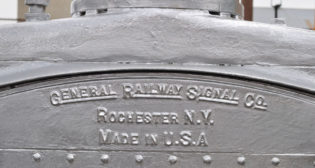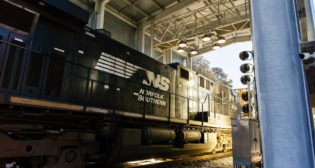
Labor’s not-so-smart gamble on FRA
Written by Frank N. Wilner, Capitol Hill Contributing EditorNews items: A convoy of self-driving trucks recently traversed Europe. Driverless trucks are undergoing public-road testing in California and Nevada. And Transportation Secretary Anthony Foxx supports development of vehicles “that can drive themselves better than a human.” Baby boomers may be skeptical, but not digital-native millennials.
Already suffering sharp declines in coal traffic, railroads soon will encounter the challenge of driverless trucks and their substantially lower operating costs, putting greater pricing pressure on commodities fungible between rail and truck. How successfully railroads confront this looming truck assault with their own productivity enhancements foreshadows the industry’s financial health.
Against this backdrop, the Federal Railroad Administration (FRA) proposes banning one-person train crews even as it oversees a $10 billion unfunded mandate that railroads install Positive Train Control (PTC) technology designed to prevent train accidents most associated with human behavior, and whose development has been enthusiastically supported by rail labor.
Where PTC is proven to render a second crew member redundant, sound economics and the efficiency mandate of National Transportation Policy dictate the redundancy be removed.
Bewildering is that the FRA admits lacking supporting data to justify a two-person crew mandate.
The chairman of the National Transportation Safety Board (NTSB) says there is no evidence two-person crews are safer than a single locomotive engineer, eliciting from the FRA a concession that “it is possible that one-person crews have contributed to the [rail industry’s] improving safety record.”
The FRA two-person crew mandate was hatched by a former FRA administrator previously employed by the Transportation Division of the International Association of Sheet Metal, Air, Rail and Transportation Workers (SMART-TD). Until then, the FRA treated crew size as a labor issue to be shaped by collective bargaining.
Not all rail-labor officers are fellow travellers with uncertain government fiat, preferring iron-clad, mutually negotiated contract protections—mindful that the pending FRA minimum crew mandate risks rejection by courts, scrapping by a Republican-controlled Congress, or eventual repeal by a less labor-friendly FRA administrator.
History supports a collective bargaining strategy.
In 2001, SMART-TD predecessor United Transportation Union convinced its members to accept locomotive remote control technology in yard switching, explaining the futility of fighting vs. collectively bargaining for improved wages and career-long income protection in return. The alternative to a mutually beneficial agreement is the risk of losing the fight, with a vengeful management dictating terms.
An FRA two-person crew mandate may sound shrewd today, but lurking are dubious courts, an inhospitable congressional majority, or a less friendly future FRA administrator.
John Babler, a former vice president of SMART-TD—still a senior officer and a perceptive student of labor-management history—understands how obduracy often backfires on workers. He led contract negotiations with BNSF to permit one-person crews on track where PTC is installed, but in exchange for improved wages and career-long income protection for those adversely impacted. The agreement was voted down, leading to FRA’s proposed two-person crew mandate.
“It would be foolish to think railroads are going to spend $10 billion on PTC and not get some sort of crew-consist relief,” Babler said, even before the collapse of coal traffic and driverless trucks appeared in the railroads’ rear-view mirror.
Babler shares broad vision and practical wisdom with former United Auto Workers President Ron Gettlefinger, credited with helping save the U.S. Big Three during the auto industry’s 2008-2010 meltdown. “We had already done a lot of things under the contracts, and we were asked to do more. We stepped up and did more … to save the industry,” Gettlefinger said.
PTC implementation coincides with the retirement of the majority of conductors protected by a previous collectively bargained crew-consist agreement. Absent a new protective agreement, thousands of conductors will be in the cross-hairs should the FRA mandate be dashed by courts, Congress or a future FRA administrator.
Labor’s outsized wager—that the FRA’s proposed mandate succeeds long-term—rejects the time-tested labor maxim, “When you get a good deal, take it.”



